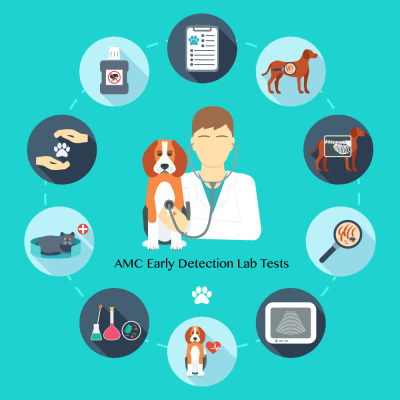It depends…
We believe that each patient should be treated as an individual; we do not believe in one-size-fits-all medicine. Therefore we try to assess the risks and needs of each patient to determine what vaccines and lab work are needed. We want to give them the vaccines they need, but not over-vaccinate them with vaccines they don’t need. We want to choose the preventive care lab profile that is right for your pet’s age and health. And we want to prevent parasites from creating problems for your pet.
General Recommendations
 1. Preventive Care Exam- every pet should have a comprehensive physical exam at least once a year. Pets with chronic diseases may need checkups twice a year.
1. Preventive Care Exam- every pet should have a comprehensive physical exam at least once a year. Pets with chronic diseases may need checkups twice a year.
2. Core vaccines- these vaccines are recommended for every pet, no matter whether they live indoors or outdoors. In some cases the vaccine will last 2 or 3 years.
a. Dogs- Rabies and DAPP (Distemper, Adenovirus, Parainfluenza, Parvovirus)
b. Cats- Rabies and RCP (Rhinotracheitis, Calicivirus, Panleukopenia)
3. Non-core vaccines- these are given on a case-by-case basis when the pet has risk factors that make them more susceptible to these diseases.
a. Dogs: Bordetella (Kennel Cough), Influenza, Lyme Disease, Leptospirosis
b. Cats: Feline Leukemia Virus
4. Lab work
a. Comprehensive Lab Profiles- includes a Complete Blood Count (CBC), full chemistry profile, thyroid screen, urinalysis and intestinal parasite exam. For dogs it includes a heartworm exam. This is recommended for senior pets, but could be done on younger ones as well.
b. Early Detection Profiles- includes a CBC, a basic chemistry profile, and an intestinal parasite exam. In cats it includes a thyroid screen and in dogs a heartworm exam. This is generally recommended for pets over 3 years of age, up until they become seniors.
c. The minimum recommendation would be at least an intestinal parasite exam, with a heartworm exam added for dogs.
5. Parasite prevention- there are multiple options that can be considered to prevent heartworms, fleas and ticks.



